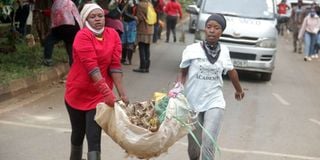Kazi Mtaani initiative has to succeed

What you need to know:
- The first phase started in April as a pilot programme focused on select informal settlements in the eight counties of Nairobi, Mombasa, Kiambu, Nakuru, Kisumu, Kilifi, Kwale and Mandera.
- Kazi Mtaani is a form of social protection for workers whose prospects for daily or casual work has been disrupted by the containment policies put in place to curb Covid-19.
- At a daily wage of Sh455, and Sh505 for supervisors, this is, perhaps, the country’s most intensive and pervasive rescue plan ever.
At the mention of food security, what comes to mind is ramping up productivity by, among others, using land efficiently, making available and affordable quality farm inputs, as well as following agronomical best practices.
While all this is crucial for an efficient production and self-sufficiency, an oft-overlooked aspect of food security is the ability of the millions of, especially, our urban poor to afford their ‘daily bread’. Affordability is an important element; we can’t all be farmers; neither is it even desirable.
Nations develop by attacking their challenges from all directions and building all-rounded societies where nobody holds the short end of the stick. That is all the more urgent now that the Covid-19 pandemic has exposed thousands of Kenyans to all sorts of challenges.
HEALTH PROTOCOLS
In a bid to control the spread of the disease first reported in the country in mid-March, the government has imposed various health protocols to reduce infections. This has averted a massive outbreak and saved many lives.
Hundreds of people have, however, paid a high price through loss of jobs after the businesses they were attached to drastically reduced their operations or closed down altogether.
Most of these are unable to feed their families. And this is why the government will do everything to ensure that any project that takes money directly to the people who need it most succeeds.
The National Hygiene Programme (NHP), popularly known as Kazi Mtaani, is one. Conceptualised as an extended public works project to utilise labour-intensive approaches to create sustainable public goods in the urban development sector, it has come in handy to cushion the youth from Covid-19.
Through this initiative, residents from informal settlements are recruited to undertake projects concentrated in and around their areas with the aim of improving the environment and service delivery infrastructure, while providing income generation opportunities.
The first phase started in April as a pilot programme focused on select informal settlements in the eight counties of Nairobi, Mombasa, Kiambu, Nakuru, Kisumu, Kilifi, Kwale and Mandera. It employed more than 26,000 young people. The second, which began this month, will run for six and a half months.
SOCIAL PROTECTION
Kazi Mtaani is a form of social protection for workers whose prospects for daily or casual work has been disrupted by the containment policies put in place to curb Covid-19. It is structured as a local economic recovery programme while nurturing responsibility towards the environment.
As it seeks to provide a welcome lifeline to the affected people, it ensures a clean environment as one way of combating the ravaging pandemic.
The programme targets jobless adults in informal settlements with payments made weekly. The second phase will be even more intensive, covering 1,200 informal settlements in the 47 counties. The programme has so far enrolled 270,000 workers. At a daily wage of Sh455, and Sh505 for supervisors, this is, perhaps, the country’s most intensive and pervasive rescue plan ever. But this is as it should be; desperate times call for desperate measures.
Those enrolled work in an 11-day rotational rota per month so as to distribute the cash to as many households as possible. In this second phase, Sh10 billion has been allocated primarily to wages.
Kazi Mtaani supplements other initiatives by the government — including by the Ministry of Labour, which normally disburses Sh1,000 to up to 235,000 vulnerable families.
STREET CLEANING
The key activities undertaken in the initial round were street cleaning or access path clearing, fumigation and disinfection, garbage collection and bush clearing, as well as drainage cleaning, clearing and unclogging. But Phase II goes beyond the routine service delivery model and focuses on longer-term projects that provide benefits to communities beyond today and tomorrow.
Construction of access roads using cobblestones, upgrading public sanitation facilities, including public toilets, increasing hand washing stations and even working to relocate water and sewer lines in places where they are exposed or pose a threat to residents are some of the projects.
Others are creating and paving walkways, building better drainage systems, constructing community gardens, green spaces and pocket parks where children can play, repairing and refurbishing public offices and nursery schools, as well as building community halls in the informal settlements.
Admittedly, such a major undertaking will have challenges. Some people have used the programme, for instance, to advance their political agenda, giving jobs to undeserving cases.
Dr Matiang'i is the Cabinet Secretary for Interior and Coordination of National Government.





